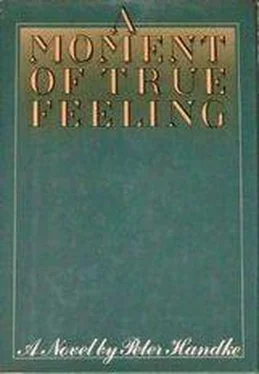Then he noticed that he had stopped reading some time ago and was only looking at the desk in front of him: the typewriter, the neatly lined-up pencils, the fountain pen POISED in his hand. How sanctimoniously I have arranged these things! he thought. In doing so, I talk myself into a sense of security that doesn’t exist. I pretend that everything will take its usual course and that nothing more will happen to me, provided I get my tools ready. — What self-deception to set up things as INSTRUMENTS and entrench himself behind them, as though he were their representative and nothing else! Did the short-wave receiving set secure his future because he used it? Or was the OUT basket beside the door a guarantee that the office boy would actually find the reports and letters expected of Keuschnig ready at the right time? — A car braked on the square outside with such a screech that Keuschnig heard the howl of a dog on whose paw he had once stepped. Once again, from one second to the next, everything hung in the balance. He would finally have to start thinking about himself. But how would he go about it? He was born into … My father was … My mother had … Even as a child I sometimes felt … Was that the only way of thinking about oneself? If I die now, Keuschnig thought, I shall leave nothing but disorder behind me! — and picking up his fountain pen, he began to draw up his will, writing every word, even the figures, in full, so as to prolong the act of writing, which made him feel safe, as much as possible. — As long as his pen was scratching, death seemed far away. He put the will in an envelope, on which he wrote: “To be opened only after my demise”—deliberately avoiding the word “death.”
He looked out at the Esplanade des Invalides: nothing characteristic, nothing for him. He forced himself to look at something to stop the pain in his heart: the construction shacks, for example, for the workers engaged in joining two Métro lines. They were so small that the workers came out backwards and stooped. So that’s it, he thought. A good many of the leaves of the shade trees on the big square were already yellow and gnawed: Well well. Or the pale moon in the eastern sky? Why not? A windowpane in the Air France bus terminal across the square was flashing sunlight into his office — as usual, but a little earlier than the day before. No harm in that, thought Keuschnig. Aloud he listed everything that was to be seen — that was his only way of perceiving.
Then he noticed that on the same story as himself, a few rooms farther on, behind the flagpole, someone was standing at the window: a girl he hardly knew, a file clerk, who had been taken on as a holiday replacement a few days before. Paying no special attention to him, she was pouring water out of a small coffee cup on a pot of geraniums. A moment later she disappeared, then came back with her refilled cup. He noticed how high over the flowers she held the cup and how carefully she regulated the stream of water. Her lips were parted, her face strangely old. All at once it seemed to him that he was watching her doing something forbidden. He felt hot and dizzy, but it was too late for him to look at something else. — When she left the window, he hoped she would come back. She reappeared sooner than he had expected; this time she positively came running, she seemed excited. She gave him a quick sidelong glance, then poured more cautiously than ever; it took her a long time to tip her cup, as though there were some resistance to overcome. Suddenly, without changing her expression, she turned back to him, and this time her glance was long and sustained — old, evil, ravaged with lust. His member went stiff, he gave a start and stepped back. — Then he forgot everything and went quickly down the corridor to her room. Inside she came to meet him. He paused to lock the door. Two, three movements and they were into each other on the floor; after two or three more she opened her eyes wide and he closed them. — A moment later they were both laughing uproariously.
Keuschnig hadn’t had the feeling of being with a unique, individual woman, and afterwards he felt free from the impersonal power that had gripped them both. — They helped each other up. They sat on two chairs, she behind the desk, he in front of it, and exchanged conspiratorial looks. She was grave, smiled only once with set lips while looking at him, and soon grew grave again. He too was able to look at her as a matter of course, without strain, without fear of giving himself away. His glance had no further need of something to hold on to, some detail, some particular by which to recognize her — he saw her all in one, noticing nothing in particular. If in that moment he had told her he loved her, he would, at least for the time it takes to draw a breath, have known what he meant by it. For the moment it was REAL, that’s all there was to it. With her he had no need of secrecy, never again. Without fear he immersed himself in her, they had no secrets from each other, only a secret in common from others. For a few moments they had EVERYTHING in common. They let the telephones in the building blare, let the elevator hum, the door-opening device in the courtyard buzz, a fly in the room hum; nothing could divert them from their unthinking calm. He looked at the handwritten sign on the wall — PER ASPERA AD ACTA; it didn’t strike him as ridiculous now, and he wasn’t repelled by the cooing of the pigeon menage which had settled in the ivy on the opposite wall. He wouldn’t have minded in the least if someone had been watching them all along. Let him watch! — They needed no secrecy, and perhaps it would even give this other fellow an idea. He kept looking at her and suddenly he thought: So now I have an ally! Though he didn’t say a word, she nodded, held a finger in front of her mouth, then set it on her lower lip, as though to underline her meaning. They laughed again, surprised and almost proud. Then they talked together, and he didn’t even mind when she said: “When I’m with a man … when someone touches me here …”—Actually he was glad to be interchangeable as far as she was concerned. In leaving the room he kissed her hand. — But when he thought of her again, back in his office, his breath caught, because he had no recollection of what it had been like to make love to her. There was no particular he could hold on to — no feeling of warmth or yielding softness. Then for the first time he felt slightly ashamed.
When at about six Keuschnig stepped out on the square, on his way to the press conference at the Elysée Palace, he suddenly stopped still and propped his hands on his hips. He felt hostile toward the whole world. “Now I’ve shown you,” he said. “I’ll get you down yet.”—With clenched fists he headed for the Pont des Invalides, crossed the Quai d’Orsay with utter unconcern for the traffic. He felt an urgent need to break some resistance, to prove himself. Now he was sure that something remained to be done — but where? The coins jangled in his pocket as he walked, but he only walked faster, ran, PURSUED. For a short time at least he had the feeling that he was all-powerful and could look down at the world. It had been made for him, and now he was forcing his way into it, to convert all its renegade objects to his way of thinking. “There you are, Mr. Seine,” he said patronizingly, as he hurried across the bridge. “Just keep up that senseless flowing — I’ll get your secret out of you yet.” Then he thought: I’m having an experience; and with that he was happy and walked more slowly. Agnes had often said to him: “You never tell me any stories.” Now he had a story to tell, how he had said: “Be still!” and for a few moments at least the world had obeyed. And he would add further particulars: steep streets had suddenly become level and whole rows of houses one floor lower. That would be the right kind of story for her, because for her “the world” was still a unit of cubic measurement. — And what if he were to tell her nothing, because he had nothing more to say? — Then at least he would have something for himself, a memory that might help him to envisage and deal with what lay inexorably ahead of him. I can be pleased, he thought with surprise: I am a person capable of being pleased. One more thing I had never thought of until today. Suddenly he wanted to draw. Moving one finger through the air, he drew the spiked-helmet roof of the Grand Palais, which he was passing on his way down the Avenue Franklin-Roosevelt …
Читать дальше












